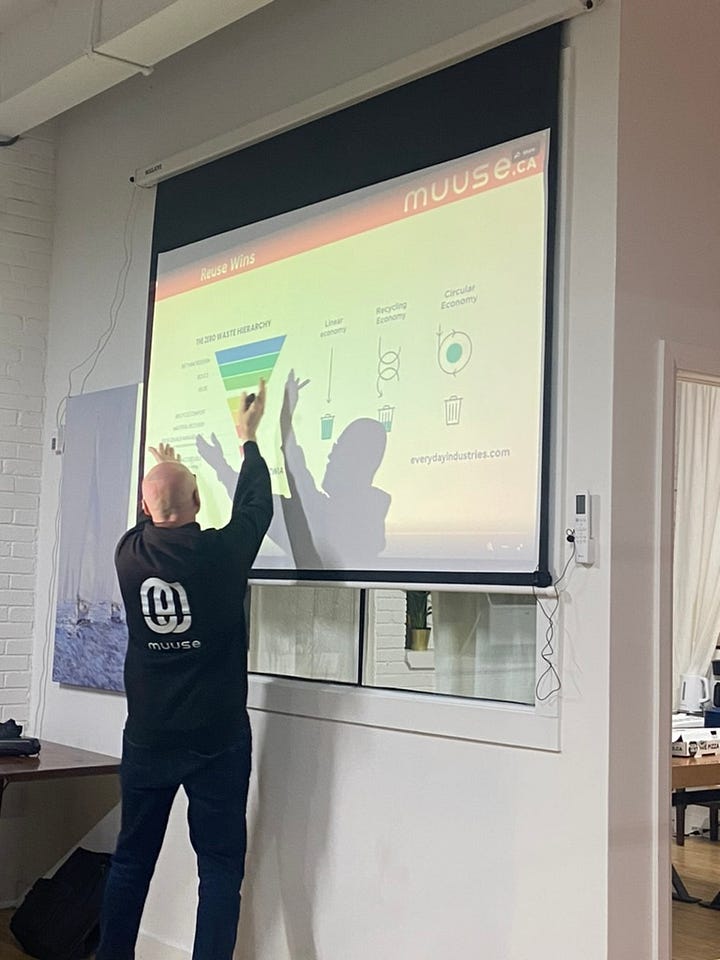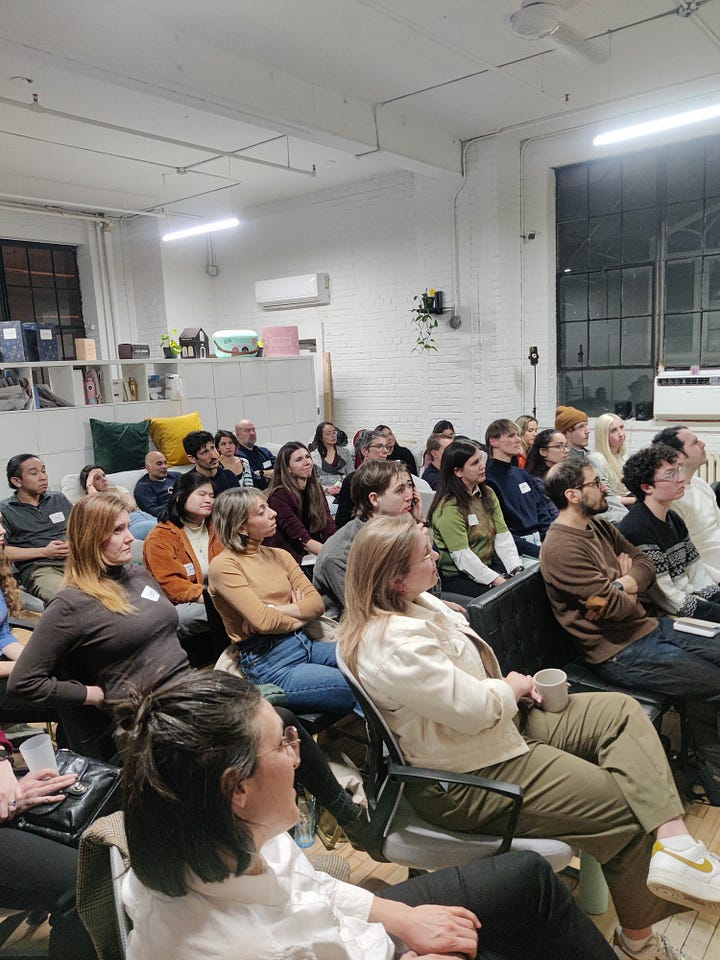



Hey there, Climate Northerners!
On January 28th, we hosted our latest event, Plastics Unwrapped.
In true Climate ‘North’ fashion, our community gathered together despite a classically Canadian snowstorm ❄️ at Orchestra Marketing to explore how plastics are warming the earth, their impacts, and a holistic approach to impactful takeaways.
The evening was filled with learning, thoughtful questions, and an insightful discussion facilitated by an expert panel.
So, if you joined us and you’re looking for a recap of the night OR if you weren’t able to make it out but want to stay in-the-loop, we’ve got you covered. 🫷
👩🏫 WHO DID WE LEARN FROM?
Meet the speakers
Madeleine Milne, Master’s student at the University of Manitoba investigating the movement and effects of microplastics on freshwater ecosystems. She shared her research, the types and prevalence of plastics, along with their impact.
Karen Wirsig, Senior Program Manager for Plastics at Environmental Defence laid out a holistic approach to reducing the production and use of plastics in our economy and in our lives.
Scott Morrison, Developing Partner of Muuse.io, showcased how to reduce single-use plastics with a circular model for takeout packaging working with local restaurants and coffee shops.
♻️AN INTRO TO PLASTICS
Why are plastics so ubiquitous?
Picture this - a day in the life of an average Canadian consumer.
The day begins with a simple press of the “brew” button on a plastic coffee machine, followed by the usual morning routine—applying a myriad of skincare and hygiene products encased in plastic packaging, throwing on sportswear infused with microplastics, and grabbing a quick takeout breakfast wrapped in plastic from a local shop on the way to work. Lunchtime arrives, and last night’s leftovers are pulled from plastic takeaway containers, while hydration comes from a plastic water bottle grabbed from the nearest office supply. The evening ends with what’s meant to be a ‘healthy’ salmon dinner—covertly laced with a mix of approximately 70 microplastics.
To put it frankly, that’s just the tip of the iceberg when it comes to our daily exposure to plastics.
Plastics are ubiquitous, but they weren’t always.
The 20th century saw a rise of plastics, marketed for both their convenience and versatility, enabling a 35 billion dollar industry in Canada alone; with only nine percent recycled, we see tonnes move to landfills, the environment, and incinerators each year.
One of our speakers, Scott, posed the simple yet powerful question, “why are we still making garbage?”
With the detrimental impacts from emissions to our health, the environmental, and social justice issues, the reasons to question the current system are undeniable.
📌 PLASTICS 101
What are they and where do they come from?
Microplastics
Small pieces of plastic, less than 5 mm in size
They may be either intentionally produced (plastic pellets) or inadvertently (breaking down from larger pieces over time)
Macroplastics
Larger pieces of plastic, greater than 5mm in size
Think of a plastic water bottle or takeout container
What is their composition?
We learned that plastics differ in their composition based on various factors, including the type of polymers used, the presence of chemical additives, the specific product applications, and their potential to leach eco-toxins into the environment
How are they produced?
98 percent of single-use plastics come from petrochemicals, generating over a billion tonnes in greenhouse gas emissions (“GHG”), annually
Why should we be concerned?
Environment – Plastics harm wildlife through chemical ingestion, entanglement, and physical damage. Our speaker, Madeleine, is working on the pESLAstic Project to assess microplastic pollution in lakes and its impact on ecosystems.
Health – We unknowingly ingest plastics and endocrine disrupting chemicals, which can interfere with development and overall well-being.
Global Warming – Plastics are primarily derived from oil and gas, driving greenhouse gas emissions and fuelling climate change.
Social – Plastic production facilities pollute the communities, contaminating air, water, and soil, disproportionately affecting vulnerable populations.

So, what do we do?
Here are 10 key recommendations that were shared by our speakers:
Call on your local representatives! Although, petition after petition may feel like a grinding effort at times, multiplying your voice can in fact have an impact
Call for regulations for grocery store packaging to eliminate single-use plastic packaging
Support reviving the deposit return for all beverage containers
Research electoral candidates that share your values before the election season!
Reduce and Reuse
Utilize the Waste Wizard site to be aware of what items may be recycled
Purchase local produce to cut down on plastic food packaging; Toronto Urban Growers and FoodShare were cited as exceptional options
No container on hand? Check out Open City where users can borrow reusable cups free for 30 days from over 50 Toronto locations
Amplify your voice by sharing the impact of plastics and actionable items to those within your network!
💡 GAME-CHANGING INSIGHTS
Key Themes from the Event
Government, Industry, and Consumers: We all have a role
There are methods of international collaboration in place to continue the conversation on plastic pollution but these can be strengthened
The impact of industry has remained strong, bolstered by lobbying efforts and their ability over the choice of their packaging
Many consumers are happy to pay a premium for plastic-free alternatives, like glass containers, as they provide a more sustainable option
Shifting from a “made to be littered” mindset towards circular economy
Approximately, 9% of global plastic waste is recycled, contributing to environmental, social justice, and health issues
There are a lot of great organizations that are illustrating both the economic and social model for a more circular economy, such as Muuse.io
The importance of research
Influential research has been conducted such as the Environmental Defence Report, the translation of risk assessment frameworks into policy, and research at field stations such as the Experimental Lakes Area
🎁 A SUSTAINABLE SURPRISE GIVEAWAY!
A big thank you to our friends at Organic Lifestyle for raffling off a washing machine filter designed to reduce microplastics—an easy step toward tackling plastic pollution at home.
Congratulations to Dale P. on your new filter!
If you missed the draw, or luck wasn’t in your cards on Tuesday, use the promo code climatenorth for 15% off at Organic Lifestyle.
And of course, gratitude to everyone who joined us, along with our incredible sponsors—Orchestra Marketing, Muuse.io, and Organic Lifestyle—for making it all possible.
🏁YOUR TURN
Grow the Climate North Community! 🌿
Know someone passionate about climate action? Share this newsletter with them and invite them to our next event!
We’ve got exciting gatherings ahead, including a Supper Club at CSI on February 25th and a Women in Climate event on March 24th —stay tuned for details.
Every new connection helps. Let’s keep building momentum together!
Written by Kathryn Weber.
- The Climate North Team
Chloe D'Agostini, Rebeka (Becky) Romanovsky, Fab Barrillot, Sarah Clayton, Julian Cheah




